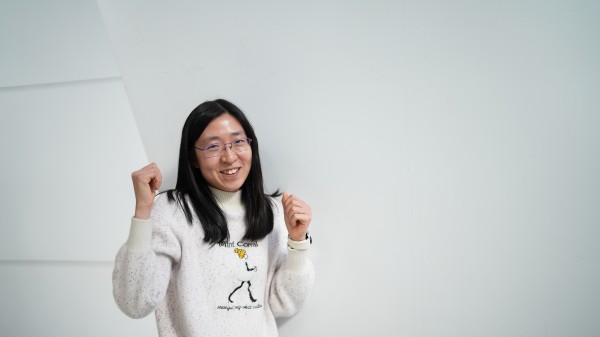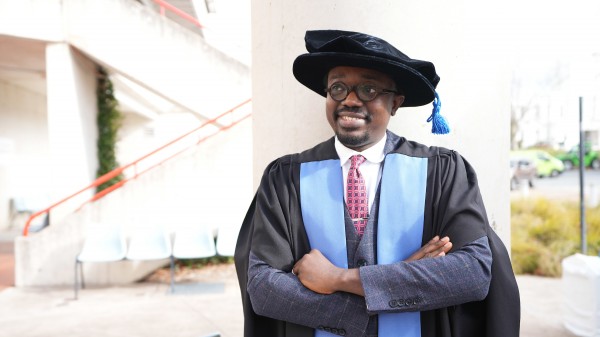The anatomy of a life changing year
Amanda Steele’s connection to her country, the Wiradjuri country of central New South Wales, is as strong as her thick Chicago accent.
“My Dad is a Wiradjuri man from Cowra, and my mum is Polish-American,” she explains.
Growing up in Australia and Chicago (“my dad wanted to raise us in Australia for a bit, so we could see both countries and choose for our self when we’re older”) Amanda decided to come to Australia for university.
“Growing up I loved art, but my parents, who are both artists, told me ‘if you choose that, you’re going to struggle like we have our whole lives. You’re good at science – do something with that then you can paint on the side always.’”
Amanda starting studying a Bachelor of Science in Wollongong, and managed to find an unexpected artistic release in an anatomy elective.
“Anatomy is such a visual discipline, and I liked how I could learn about my own body; knowing where everything is and what things are called,” she explains.
“I transferred to ANU after that, and graduated from a Bachelor of Science in 2013. After my Bachelor degree, I was torn between undertaking research, and doing medicine.
“I decided to give the GAMSAT a go, and I ended up getting into the ANU Medical School. I’m so glad I did! I was also awarded the Dr Peter Sharp Scholarship, which was a huge honour.”
The first two years of medicine were “so exciting”, but the third was life-changing.
“At the start of third year, my dad was diagnosed with oesophageal cancer, which is a really aggressive type cancer.
“I had just learned about it in School, and one of the teachers had said ‘you don’t want to get this one – it’s really bad.’
“I was able to enrol in the School’s Rural Stream and complete a yearlong placement in Cowra, where my parents live and where my ancestors are from.
“This meant I could live with my parents and be with my dad. Being by my dad’s side was really hard, because it’s with you every day; the sickness and dealing with chemo and everything. It was really challenging.”
Keen to reconnect with her Indigenous heritage, Amanda also took part in the Indigenous Health Stream in her third year.
“I had the chance undertake a six week placement in Yuendumu, a remote town in the Northern Territory. There’s not much there, you don’t have the convenience of the stores or anything, and you’re quite isolated.
“As an Aboriginal person, even just as a human, I found facing the disparities in health outcomes for our Indigenous population so emotionally challenging. But it was such a beautiful experience – hard, but so spiritually amazing.
“One of the elder ladies there taught me some of the Warlpiri language, so when patients came in, I would try to say things to them in Warlpiri, like ‘hi’ and ‘how are you?’ It was such a good opportunity to learn how to connect with different cultures.”
On reflection, Amanda now calls one of the hardest years of her life one of the best years of her life, helping her develop essential skills required of a new Doctor.
“My dad is doing really well now, and I feel so blessed for the experiences I had in third year. I even ended up doing the best in my exams that year! It really showed me how I work better under pressure.”
Amanda’s personal connection to her country, and experiences on placement in Yuendumu have fostered a strong passion for Indigenous health.
“The reason I wanted to do medicine was because I’m so passionate about Aboriginal health. I can’t see myself ever not doing something in Aboriginal health one way or another – whether it’s mentoring, or whether it’s working with Aboriginal patients.”
“The Indigenous Health Stream was a great support for me, because it enabled me to connect with my culture throughout Medical School, which was so good for the mind, body and soul.
“The Tjabal Centre at ANU was also like a home away from home whilst I was studying, it is such a family-oriented place. You felt so comfortable there, and I was provided with a lot of moral support.
“Having people you can talk to when you’re not used to being in such an institution, familiar faces like Aunty Anne and Professor Richard Baker, made a big difference.”
When Amanda graduates on Wednesday 13 December as Dr Steele, she’s keen to hit the ground running as a Junior Doctor at the Tweed Heads Hospital.
“My parents are more excited than I am! I don’t know if it’s hit me that I’m graduating yet, it’s very surreal, and I feel quite humbled.
“I know this is only the beginning, so I’m excited to see where my career takes me. I hope I can make a difference with Aboriginal Australia.”








